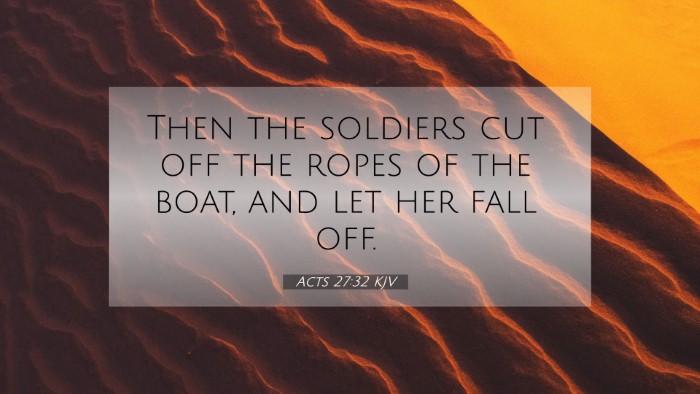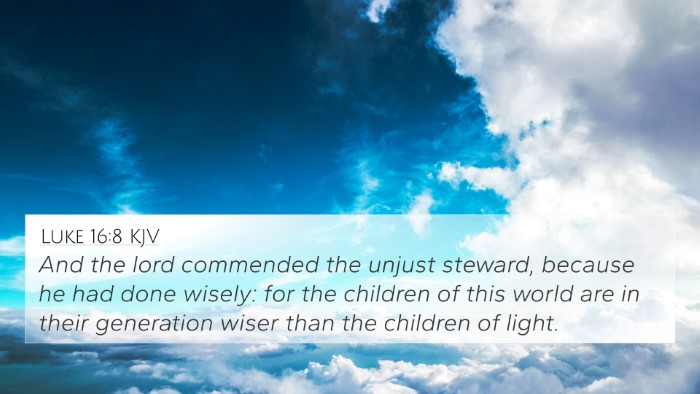Understanding Acts 27:32
Acts 27:32 states, "Then the soldiers cut the ropes of the lifeboat and let it fall away." This verse captures a pivotal moment during Paul's journey to Rome, where he is a prisoner on a ship facing a severe storm. The verse illustrates the tension between fear and faith, choices made in desperation, and the unfolding of God's providential plan.
Verse Context
This event occurs during a perilous sea voyage, where the ship carrying Paul and others is trapped in a fierce storm. Paul's confidence in God's promises stands in stark contrast to the crew's fear, showcasing his leadership and faith amidst chaos.
Commentary Insights
Matthew Henry's Commentary
Matthew Henry emphasizes that the soldiers' decision to cut loose the lifeboat symbolizes acts of desperation where faith is being tested. He notes that the lifeboat, a means of survival, reflects the human instinct to seek safety through visible means. In cutting it loose, they were forced to rely solely on divine intervention, highlighting God's control over dire situations.
Albert Barnes' Commentary
In understanding Acts 27:32, Albert Barnes discusses the implications of the soldiers’ actions as an act of surrendering to the will of God, indicating a shift from self-reliance to faith in God’s assurance given to Paul. Barnes points out that letting the lifeboat drift away represents a key turning point, presenting a lesson about abandoning worldly supports to embrace God’s deliverance.
Adam Clarke's Commentary
Adam Clarke provides a practical examination, suggesting that the decision to cut away the lifeboat signifies a commitment to the journey ahead. It reflects a moment where individuals must confront their fear and trust in God's promises. This moment not only abates their fears but encourages reliance on God's providence, illustrating the transformative power of faith in crisis.
Bible Cross-References
This verse connects with several other scriptures, which helps to form a greater understanding of its themes:
- Genesis 37:24 - This verse illustrates the idea of abandonment and the importance of reliance on God.
- Acts 27:22-24 - Here, Paul reassures the men on the ship of God's promise, which contextualizes their desperation.
- Psalm 107:28-30 - This psalm speaks of God's deliverance in times of trouble, much like the context in Acts 27.
- Matthew 14:30-31 - The story of Peter walking on water reinforces themes of faith and reliance on God amid storms.
- Isaiah 41:10 - God's promise of support and strength embodies the assurance Paul offers during the storm.
- Hebrews 11:1 - The essence of faith discussed in this verse resonates with Paul's unwavering trust in God's plan.
- Philippians 4:6-7 - This passage on anxiety and prayer aligns with the response required during desperate times, echoing Paul's composure.
- John 16:33 - A reminder from Jesus that in the world we will face troubles, but we can be of good cheer through faith.
- 2 Timothy 4:17-18 - Paul speaks of deliverance in perilous situations, affirming God’s faithful protection.
- Psalm 33:20-22 - This passage encourages hope in God's unfailing love and deliverance, central themes in Paul's journey.
Conclusion
The insights from various commentaries deepen the appreciation of Acts 27:32 and provide valuable connections to numerous other Biblical texts. Through tools for Bible cross-referencing and a commitment to understanding scripture, one can uncover rich theological treasure, illustrating the interconnectedness of God's word.
Exploring Themes and Applications
This verse serves as a powerful reminder of reliance on God during life's tempests. It invites believers to reflect on their sources of safety and to consider how they might be challenged to let go of their 'lifeboats' in order to fully embrace faith in divine guidance.
As one seeks to explore Bible verses that relate to each other, employing a systematic cross-reference approach can enrich one's spiritual journey, foster a deeper understanding of God’s character, and deepen the faith experience.




